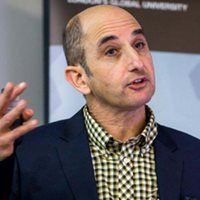Improving data for meningitis: recognition, diagnosis and surveillance - closing the ascertainment gap between people affected and laboratory surveillance
Chair: Dr Anne von Gottberg, NICD, Johannesburg
 Anne von Gottberg is currently the laboratory lead for the Centre for Respiratory Diseases and Meningitis at the National Institute for Communicable Diseases, Johannesburg, South Africa and Associate Professor within the School of Pathology, Faculty of the Health Sciences, University of the Witwatersrand, Johannesburg; and Honorary Professor, Department of Pathology, Faculty of Health Sciences, University of Cape Town, Cape Town. She leads a laboratory team responsible for reference diagnostics for respiratory and meningeal pathogens nationally and regionally. The laboratory is the regional reference laboratory for the World Health Organization (WHO) Vaccine-preventable Invasive Bacterial Diseases (VP-IBD) Coordinated Global Surveillance Network for the southern African region; a National Influenza Centre (NIC); and a WHO RSV and SARS-CoV-2 Reference Laboratory. Her main interests include surveillance for meningitis and respiratory pathogens, assessing vaccine effectiveness where relevant. She has authored or co-authored more than 200 articles in peer-reviewed journals. In addition, she supervises a number of Masters and PhD students. Dr von Gottberg obtained her MBBCh and PhD at the University of the Witwatersrand, and trained for her specialisation in clinical microbiology (FC Path[SA] MICRO) at the National Health Laboratory Service (former South African Institute for Medical Research) and at the University of the Witwatersrand.
Anne von Gottberg is currently the laboratory lead for the Centre for Respiratory Diseases and Meningitis at the National Institute for Communicable Diseases, Johannesburg, South Africa and Associate Professor within the School of Pathology, Faculty of the Health Sciences, University of the Witwatersrand, Johannesburg; and Honorary Professor, Department of Pathology, Faculty of Health Sciences, University of Cape Town, Cape Town. She leads a laboratory team responsible for reference diagnostics for respiratory and meningeal pathogens nationally and regionally. The laboratory is the regional reference laboratory for the World Health Organization (WHO) Vaccine-preventable Invasive Bacterial Diseases (VP-IBD) Coordinated Global Surveillance Network for the southern African region; a National Influenza Centre (NIC); and a WHO RSV and SARS-CoV-2 Reference Laboratory. Her main interests include surveillance for meningitis and respiratory pathogens, assessing vaccine effectiveness where relevant. She has authored or co-authored more than 200 articles in peer-reviewed journals. In addition, she supervises a number of Masters and PhD students. Dr von Gottberg obtained her MBBCh and PhD at the University of the Witwatersrand, and trained for her specialisation in clinical microbiology (FC Path[SA] MICRO) at the National Health Laboratory Service (former South African Institute for Medical Research) and at the University of the Witwatersrand.
Advocacy and awareness raising activity and the WHO Defeating Meningitis by 2030 Roadmap
Rob Dawson
Meningitis Research Foundation
 Rob Dawson is a strategic communications director with experience in health and science across industry, public sector and not-for-profits.
Rob Dawson is a strategic communications director with experience in health and science across industry, public sector and not-for-profits.
He is former Director of Communications, Advocacy and Support at Meningitis Research Foundation, Chair of the STEM PR Association, Chartered Institute of Public Relations (CIPR) member and has also guest-lectured at Cambridge and Kent Universities.
He has led teams to win several awards for meningitis advocacy and communications activities, including Third Sector Award 2018 Communications Campaign of the Year, for Meningitis Research Foundation’s adolescent vaccine campaign, and Communique Charitable Campaign of the Year 2021, for supporting the development of the Global Roadmap to Defeat Meningitis.
Since the recording of this presentation at our November 2021 conference, it is with great sadness that we let you know of the death of our friend and former colleague Rob Dawson, who for over 5 years was the Director of Advocacy, Communications and Support at Meningitis Research Foundation, achieving enormous amounts in his time with us.
Challenges and possible solutions to improving laboratory confirmation of bacterial meningitis
Dr André Bita
WHO
 Dr Andre Arsene Bita Fouda is WHO Regional meningitis control officer, in Brazzaville, Republic of Congo. In this role, Dr Bita’s responsibilities include: providing technical support and guidance to African Countries on Meningococcal vaccines for prevention and reactive vaccination mass campaigns and introduction into routine immunization; monitoring progress on introduction of MenAfriVac in the African meningitis belt countries; providing technical support and guidance to African countries on surveillance, data management and care of patents with sequelae, case management, preparation and response to meningitis epidemics; and developing regional guidelines on meningitis control. With regards to COVID-19, Dr Bita is a member of the Programme, Monitoring, Evaluation and Reporting cell in WHO regional office. Prior to this, he was a WHO Consultant on the Meningitis Vaccine Project (MVP) 2014-2017; Regional meningitis control officer (2018-2021). Dr Bita has authored 63 publications in 17 peer review journals and co-authored four guidelines: Immunization, surveillance and response to outbreaks (meningitis, measles, cholera, COVID-19); HIV/AIDS; health economics; occupational Medicine.
Dr Andre Arsene Bita Fouda is WHO Regional meningitis control officer, in Brazzaville, Republic of Congo. In this role, Dr Bita’s responsibilities include: providing technical support and guidance to African Countries on Meningococcal vaccines for prevention and reactive vaccination mass campaigns and introduction into routine immunization; monitoring progress on introduction of MenAfriVac in the African meningitis belt countries; providing technical support and guidance to African countries on surveillance, data management and care of patents with sequelae, case management, preparation and response to meningitis epidemics; and developing regional guidelines on meningitis control. With regards to COVID-19, Dr Bita is a member of the Programme, Monitoring, Evaluation and Reporting cell in WHO regional office. Prior to this, he was a WHO Consultant on the Meningitis Vaccine Project (MVP) 2014-2017; Regional meningitis control officer (2018-2021). Dr Bita has authored 63 publications in 17 peer review journals and co-authored four guidelines: Immunization, surveillance and response to outbreaks (meningitis, measles, cholera, COVID-19); HIV/AIDS; health economics; occupational Medicine.
Developing and deploying RDTs for the main meningitis pathogens: where we are now and what’s happening next
Dr Xin Wang
Centres for Disease Control and Prevention
 Dr. Xin Wang earned her PhD from Emory University Department of Microbiology and Immunology. Currently, Dr. Wang is the chief of Bacterial Meningitis Laboratory within Meningitis and Vaccine Preventable Diseases Branch at CDC and the Director of WHO Collaborating Center for Meningitis. In this role, Dr. Wang is responsible for establishing team goals and priorities, developing strategic plans to support public health priorities, leading studies and activities to bridge knowledge gaps, and providing technical expertise to support meningitis surveillance and outbreak response domestically and internationally. Over the course of more than 14 years at CDC, Dr. Wang has led a number of projects to advance the understanding of meningococcal disease/carriage, improve laboratory and informatics methods for disease surveillance, monitor genomic epidemiology and antibiotic resistance trends, and evaluate vaccine antigens for strain coverage. She has authored or co-authored more than 120 scientific articles in peer-reviewed journals. Additionally, Dr. Wang has led laboratory building capacities in a number of countries in Africa and Asia, including providing national and regional trainings, developing standardized training programs, as well as serving on workgroups and steering committees to provide technical consultation. She has won more than 30 CDC and NCIRD honor awards in recognition of her leadership and scientific contributions.
Dr. Xin Wang earned her PhD from Emory University Department of Microbiology and Immunology. Currently, Dr. Wang is the chief of Bacterial Meningitis Laboratory within Meningitis and Vaccine Preventable Diseases Branch at CDC and the Director of WHO Collaborating Center for Meningitis. In this role, Dr. Wang is responsible for establishing team goals and priorities, developing strategic plans to support public health priorities, leading studies and activities to bridge knowledge gaps, and providing technical expertise to support meningitis surveillance and outbreak response domestically and internationally. Over the course of more than 14 years at CDC, Dr. Wang has led a number of projects to advance the understanding of meningococcal disease/carriage, improve laboratory and informatics methods for disease surveillance, monitor genomic epidemiology and antibiotic resistance trends, and evaluate vaccine antigens for strain coverage. She has authored or co-authored more than 120 scientific articles in peer-reviewed journals. Additionally, Dr. Wang has led laboratory building capacities in a number of countries in Africa and Asia, including providing national and regional trainings, developing standardized training programs, as well as serving on workgroups and steering committees to provide technical consultation. She has won more than 30 CDC and NCIRD honor awards in recognition of her leadership and scientific contributions.
Distinguishing bacterial infections using a host signature: PERFORM- DIAMONDS studies
Dr Jethro Herberg
Imperial College London
 Dr Jethro Herberg is a Reader in Paediatric Infectious Diseases at Imperial College London, and honorary consultant at Imperial College Healthcare NHS Trust and the Royal Brompton Hospital. After studying Biochemistry at Oxford and a human immunogenetics PhD at the Imperial Cancer Research Fund, he trained in medicine at University College London. He has worked at Imperial College since 2008.
Dr Jethro Herberg is a Reader in Paediatric Infectious Diseases at Imperial College London, and honorary consultant at Imperial College Healthcare NHS Trust and the Royal Brompton Hospital. After studying Biochemistry at Oxford and a human immunogenetics PhD at the Imperial Cancer Research Fund, he trained in medicine at University College London. He has worked at Imperial College since 2008.
His research focuses on the discovery and clinical translation of host diagnostic biomarkers for children with infectious and inflammatory conditions. Current projects include DIAMONDS (www.diamonds2020.eu), a large international study of febrile children that is developing and piloting the use of novel technology platforms that use host transcript-based tests for multi-class diagnosis of infectious and inflammatory conditions. His specialist clinical interests include the investigation of genetic predisposition in children with severe infection, and Kawasaki disease.
Discriminatory host transcripts in the blood of adults with bacterial meningitis: TRIM study
Dr Mike Griffiths
University of Liverpool
 I am a Reader and Paediatric Neurology consultant in the Department of Clinical Infection, Microbiology and Immunology at the Institute of Infection, Veterinary and Ecological Sciences at the University of Liverpool and Alder Hey Children’s NHS Trust.
I am a Reader and Paediatric Neurology consultant in the Department of Clinical Infection, Microbiology and Immunology at the Institute of Infection, Veterinary and Ecological Sciences at the University of Liverpool and Alder Hey Children’s NHS Trust.
My team's main aim is to improve diagnosis, treatment and management of infection, with a focus on brain infections, such as meningitis, encephalitis and neurosurgical-infection.
My research Interests lie on the host responses to severe infection, particularly neurological insults. We use a variety of approaches, including transcriptomic and proteomic approaches to explore these responses.
I am PI for the several UK and international studies, including TRIM (TRanscripts Identifying Meningitis) and DIME (Diagnostic Improvement for Meningo-encephalitis) studies.
Mike is also diagnostic lead, for several studies improving management of brain infections in the UK and overseas. Studies include sites across UK, Denmark, Netherlands, Indonesia, Malawi, India and Brazil.
I work with various 3rd sector organisations, including NICE, WHO, PATH and Industry, as well as being Chair of Education, Quality and Standards for the British Paediatric Neurology Association (BPNA) in UK and Ireland.
Funding sources for the work include the MRC, Newton fund, Wellcome Trust, EU Horizon 2020 and NIHR. I previously trained in Oxford, Kenya (Kilifi) and Stanford (USA) as well as multiple UK hospitals, and I maintain collaborations with these Institutes.
Publications include the Lancet, Lancet Infectious Diseases, Lancet Neurology and Lancet Child and Adolescent Health.
Genomics: the frontier of learning
Chair: Dr Ifedayo Adetifa, KEMRI-Wellcome Trust/LSHTM
 Ifedayo M. O Adetifa MBBS, FWACP (Paed), MSc PhD, is the 2nd Director General of the Nigeria Centre for Disease Control (NCDC). He is a paediatrician and epidemiologist, with almost two decades of working experience in general paediatrics, paediatrics infectious diseases and infectious disease epidemiology. His work to date has covered the areas of paediatrics HIV/AIDS, tuberculosis epidemiology and the epidemiology of vaccine-preventable diseases. In the last seven years, he has focused on vaccine epidemiology research with an overarching aim of generating evidence for vaccine policy in Africa through vaccine impact studies and seroepidemiology. He has also been involved in the COVID-19 response through his activities as a member of the Kenya SARS-CoV-2 Serology Consortium. As part of his activities in the vaccine policy arena, he is a member of the World Health Organisation, Africa Region’s (WHO-AFRO) Regional Immunisation Technical Advisory Group, the WHO Respiratory Syncytial Virus Technical Advisory Group, and the Programme Advisory Group for the Malaria Vaccine Implementation Programme. Members of the Kenya SARS-CoV-2 Serology Consortium
Ifedayo M. O Adetifa MBBS, FWACP (Paed), MSc PhD, is the 2nd Director General of the Nigeria Centre for Disease Control (NCDC). He is a paediatrician and epidemiologist, with almost two decades of working experience in general paediatrics, paediatrics infectious diseases and infectious disease epidemiology. His work to date has covered the areas of paediatrics HIV/AIDS, tuberculosis epidemiology and the epidemiology of vaccine-preventable diseases. In the last seven years, he has focused on vaccine epidemiology research with an overarching aim of generating evidence for vaccine policy in Africa through vaccine impact studies and seroepidemiology. He has also been involved in the COVID-19 response through his activities as a member of the Kenya SARS-CoV-2 Serology Consortium. As part of his activities in the vaccine policy arena, he is a member of the World Health Organisation, Africa Region’s (WHO-AFRO) Regional Immunisation Technical Advisory Group, the WHO Respiratory Syncytial Virus Technical Advisory Group, and the Programme Advisory Group for the Malaria Vaccine Implementation Programme. Members of the Kenya SARS-CoV-2 Serology Consortium
Until his current appointment as the Director General of the Nigeria Centre for Disease Control, he was an Associate Professor of Infectious Disease Epidemiology at the London School of Hygiene and Tropical Medicine (LSHTM), United Kingdom, and Clinical Epidemiologist at the Kenya Medical Research Institute (KEMRI)- Wellcome Trust Research Programme (KWTRP) in Kilifi, Kenya from 2014 to date. And prior to this he was a Clinical Epidemiologist at the Medical Research Council Unit The Gambia.
Dr Ifedayo Adetifa received his undergraduate medical qualification from the University of Ilorin, Kwara State, Nigeria, studied for his Masters in Epidemiology at the London Shool of Hygiene and Tropical Medicine and received his PhD also in Epidemiology from the University of Amsterdam, The Netherlands. He completed clinical specialty training at the Lagos University Teaching Hospital, Idi-Araba, Lagos for which he was awarded the Fellowship of the West African College of Physicians in Paediatrics.
Pneumococcal genomics, vaccines and AMR
Dr William Hanage
Harvard T. H. Chan School of Public Health
 Dr. Bill Hanage is an Associate Professor of Epidemiology in the Center for Communicable Disease Dynamics at Harvard T. H. Chan School of Public Health. His research and teaching focus on the epidemiology of infectious disease and the evolution of infectious agents. He received his PhD from Imperial College London. He joined the faculty at Harvard T. H. Chan School of Public Health in 2010. He has made seminal contributions to the study of diverse pathogens, both bacteria and viruses, and has a special interest in evolution in response to interventions such as vaccination or antimicrobials, using laboratory based and computational methods. His awards include the Fleming Prize from the Microbiology Society and a young investigator award from the American Society for Microbiology. He has published more than scientific 160 articles and book chapters and is a regular contributor to popular media aiming to improve public understanding of the SARS-CoV-2 pandemic.
Dr. Bill Hanage is an Associate Professor of Epidemiology in the Center for Communicable Disease Dynamics at Harvard T. H. Chan School of Public Health. His research and teaching focus on the epidemiology of infectious disease and the evolution of infectious agents. He received his PhD from Imperial College London. He joined the faculty at Harvard T. H. Chan School of Public Health in 2010. He has made seminal contributions to the study of diverse pathogens, both bacteria and viruses, and has a special interest in evolution in response to interventions such as vaccination or antimicrobials, using laboratory based and computational methods. His awards include the Fleming Prize from the Microbiology Society and a young investigator award from the American Society for Microbiology. He has published more than scientific 160 articles and book chapters and is a regular contributor to popular media aiming to improve public understanding of the SARS-CoV-2 pandemic.
Hypervirulence and Group B Streptococcal Infection
Dr Odile Harrison
University of Oxford
 Odile Harrison PhD, has been studying infectious diseases and the evolution of bacterial pathogens for over 10 years. After graduating with a Microbiology degree from University College London, she pursued a Ph.D. in Medical Microbiology at Imperial College London, where in vivo gene expression of the human bacterial pathogen Neisseria meningitidis was investigated. After this, she obtained a Marie Curie postdoctoral fellowship and worked at Sanofi Pasteur in Lyon, France where she researched the diversity of iron acquisition proteins in Neisseria species. At the University of Oxford, Odile has pursued her interest in the population biology of Neisseria including the analysis of whole-genome sequence (WGS) data. More recently, her work has expanded to the analysis of WGS data from other encapsulated bacteria and sexually-transmitted bacterial infections. Odile is an associate editor of the Journal of Infection and is a fellow of the Higher Education academy
Odile Harrison PhD, has been studying infectious diseases and the evolution of bacterial pathogens for over 10 years. After graduating with a Microbiology degree from University College London, she pursued a Ph.D. in Medical Microbiology at Imperial College London, where in vivo gene expression of the human bacterial pathogen Neisseria meningitidis was investigated. After this, she obtained a Marie Curie postdoctoral fellowship and worked at Sanofi Pasteur in Lyon, France where she researched the diversity of iron acquisition proteins in Neisseria species. At the University of Oxford, Odile has pursued her interest in the population biology of Neisseria including the analysis of whole-genome sequence (WGS) data. More recently, her work has expanded to the analysis of WGS data from other encapsulated bacteria and sexually-transmitted bacterial infections. Odile is an associate editor of the Journal of Infection and is a fellow of the Higher Education academy
How this will be made accessible through the Global Meningitis Genome Partnership
Professor Robert Heyderman
University College London
 Rob Heyderman is a clinician scientist with skills and experience that bridge clinical practice, disease prevention and the fundamental understanding of the mechanisms of infectious disease. He directed the highly successful Malawi-Liverpool-Wellcome Trust Programme (MLW) for over 8 years, transforming the Programme into a centre of excellence led by Malawian & international scientists, pursuing internationally-leading science, research training & improving the health of people in sub-Saharan Africa. At UCL, he has established a Mucosal Pathogens Research Group which focuses on the microbial and immunological basis of severe infection caused by bacterial and viral mucosal pathogens in the UK and Africa, and their prevention through vaccination. His population-based studies of vaccine-preventable disease in Africa have led to national vaccine implementation, vaccine evaluation and large-scale studies of modified vaccine schedules. Working with WHO AFRO, he is leading the evaluation of COVID19 vaccines in vulnerable adults. He is a member of several guideline committees for the diagnosis & management of meningitis and meningogoccal sepsis. He is a member of the task force for WHO Road Map for Defeating Meningitis. He chairs the Global Meningitis Genome Partnership.
Rob Heyderman is a clinician scientist with skills and experience that bridge clinical practice, disease prevention and the fundamental understanding of the mechanisms of infectious disease. He directed the highly successful Malawi-Liverpool-Wellcome Trust Programme (MLW) for over 8 years, transforming the Programme into a centre of excellence led by Malawian & international scientists, pursuing internationally-leading science, research training & improving the health of people in sub-Saharan Africa. At UCL, he has established a Mucosal Pathogens Research Group which focuses on the microbial and immunological basis of severe infection caused by bacterial and viral mucosal pathogens in the UK and Africa, and their prevention through vaccination. His population-based studies of vaccine-preventable disease in Africa have led to national vaccine implementation, vaccine evaluation and large-scale studies of modified vaccine schedules. Working with WHO AFRO, he is leading the evaluation of COVID19 vaccines in vulnerable adults. He is a member of several guideline committees for the diagnosis & management of meningitis and meningogoccal sepsis. He is a member of the task force for WHO Road Map for Defeating Meningitis. He chairs the Global Meningitis Genome Partnership.
Poster Presentations - three parallel sessions
Track 1: Prevention – Chair: Professor Paul Heath, St George’s University of London
Identification of Neisseria meningitidis specific patient derived antibodies using reverse vaccinology 2.0 - Camilla Gladstone, Imperial College London
Changes in the epidemiology of invasive meningococcal diseases during the COVID-19 pandemic in Germany- Dr Manuel Krone, Wuerzburg University Hospital and German National Reference Laboratory for Neisseria meningitidis and Haemophilus influenzae
Natural Immunity in the African Meningitis Belt to Neisseria meningitidis serogroup X: A Seroprevalence Study – Sara Katz, UK Health Security Agency
Neisseria lactamica induces anti-Neisseria meningitidis B cell responses- Dr Adam Dale, University of Southampton
Immunogenicity of a Single 4CMenB Vaccine Booster in Adolescents 11 Years After Childhood Immunisation - Professor Sir Andrew Pollard, University of Oxford
Camilla Gladstone
Imperial College London
 Millie is a final year PhD student at Imperial College London in the Department of Infectious Disease. She graduated from Exeter University in 2016 with a BSc in Biological Sciences (Microbiology and Infectious Disease) before completing an MSc in Medical Microbiology at the London School of Hygiene and Tropical Medicine in 2017. Her PhD incorporates immunology, molecular biology and microbiology to improve vaccines against meningococcal meningitis.
Millie is a final year PhD student at Imperial College London in the Department of Infectious Disease. She graduated from Exeter University in 2016 with a BSc in Biological Sciences (Microbiology and Infectious Disease) before completing an MSc in Medical Microbiology at the London School of Hygiene and Tropical Medicine in 2017. Her PhD incorporates immunology, molecular biology and microbiology to improve vaccines against meningococcal meningitis.
Millie uses a technique called Reverse Vaccinology 2.0 to find meningococcal vaccine antigens. This technique clones antibodies against meningococci from patient blood samples, before identifying the target antigen on the bacteria. This target could be included in a future vaccine against meningococci, preventing meningococcal infections.
Outside of work Millie enjoys sports, including playing netball for Imperial, and is a keen amateur baker!
Dr Manuel Krone
Wuerzburg University Hospital and German National Reference Laboratory for Neisseria meningitidis and Haemophilus influenzae
 Dr Manuel Krone is Deputy Head of the Infection Control and Antimicrobial Stewardship Unit at Wuerzburg University Hospital, Germany, and works at the German National Reference Laboratory for Meningococci and Haemophilus Influenzae.
Dr Manuel Krone is Deputy Head of the Infection Control and Antimicrobial Stewardship Unit at Wuerzburg University Hospital, Germany, and works at the German National Reference Laboratory for Meningococci and Haemophilus Influenzae.
Prior to this, he trained in clinical microbiology at the University of Wuerzburg, Germany. Dr. Krone's principal areas of research relate to the epidemiology and prevention of airborne diseases with focus on Neisseria meningitidis, Haemophilus influenzae and SARS-CoV-2.
He is currently the chief investigator of the 'CoVacSer' study to evaluate the impact of COVID-19 infections and immunizations on health-related quality of life and fitness for work in healthcare workers. Other projects include recurring invasive meningococcal disease and the impact of Haemophilus influenzae colonization on pregnancy outcome.
Sara Katz
UK Health Security Agency
 Sara Katz is a Healthcare Scientist at the Vaccine Evaluation Unit at the UK Health Security Agency (formerly Public Health England), Manchester, UK, where she and her team evaluate serological responses to meningococcal vaccines.
Sara Katz is a Healthcare Scientist at the Vaccine Evaluation Unit at the UK Health Security Agency (formerly Public Health England), Manchester, UK, where she and her team evaluate serological responses to meningococcal vaccines.
She completed a BSc in Healthcare Science at the University of Central Lancashire and qualified as a HCPC registered biomedical scientist in 2017. She has recently finished study on a MRes in Healthcare Sciences at Manchester Metropolitan University. Her masters project focused on seroprevalence of N. meningitidis serogroup X within the African meningitis belt, and validation of a serogroup X Serum Bactericidal Antibody assay for use in clinical trials.
Dr Adam Dale
University of Southampton
 Adam Dale is a NIHR Academic Clinical Lecturer in Infectious Diseases at the University of Southampton, and honorary registrar in Infectious Diseases and Medical Microbiology at University Hospital Southampton. He works in the research group of Professor Robert Read in close collaboration with the NIHR Clinical Research Facility at University Hospital Southampton and the Southampton NIHR Biomedical Research Centre. During his Wellcome Trust-funded PhD Research Training Fellowship, Adam studied the adaptive cellular immune responses generated following pharyngeal colonisation with wild-type and genetically modified strains of Neisseria lactamica. Adam is currently utilising N. lactamica and Bordetella pertussis controlled human infection models to better understand the factors affecting bacterial colonisation and the interaction of colonising bacteria with the human immune system.
Adam Dale is a NIHR Academic Clinical Lecturer in Infectious Diseases at the University of Southampton, and honorary registrar in Infectious Diseases and Medical Microbiology at University Hospital Southampton. He works in the research group of Professor Robert Read in close collaboration with the NIHR Clinical Research Facility at University Hospital Southampton and the Southampton NIHR Biomedical Research Centre. During his Wellcome Trust-funded PhD Research Training Fellowship, Adam studied the adaptive cellular immune responses generated following pharyngeal colonisation with wild-type and genetically modified strains of Neisseria lactamica. Adam is currently utilising N. lactamica and Bordetella pertussis controlled human infection models to better understand the factors affecting bacterial colonisation and the interaction of colonising bacteria with the human immune system.
Professor Sir Andrew Pollard
University of Oxford
 Professor Sir Andrew Pollard FMedSci
Professor Sir Andrew Pollard FMedSci
Professor of Paediatric Infection and Immunity
Professor Pollard is Director of the Oxford Vaccine Group in the Department of Paediatrics at the University of Oxford and an honorary consultant paediatrician at Oxford Children’s Hospital, where he led the paediatric infectious disease clinical service 2001-2021. He was Director of Graduate Studies in the Department of Paediatrics 2012-2020 and Vice-Master of St Cross College, Oxford, 2017-2021, and remains a Fellow of the College. He received a knighthood in the Queen’s Birthday Honours in 2021 for services to Public Health, especially in the pandemic.
Professor Pollard obtained his medical degree at St Bartholomew’s Hospital Medical School, University of London, in 1989 and trained in Paediatrics at Birmingham Children’s Hospital specialising in Paediatric Infectious Diseases at St Mary’s Hospital, London, and at British Columbia Children’s Hospital, Vancouver, Canada. He obtained his PhD at St Mary’s Hospital in 1999 studying immunity to Neisseria meningitidis in children and proceeded to work on anti-bacterial innate immune responses in children in Canada before returning to his current position at the University of Oxford in 2001. He chaired the UK’s National Institute for Health and Care Excellence (NICE) meningitis guidelines development group (2006-2010), the NICE topic expert group developing quality standards for management of meningitis and meningococcal septicaemia (2011-2013). He has been a member of the British Commission on Human Medicines' Clinical Trials, Biologicals and Vaccines expert advisory group since 2013.
His research includes the design, development and clinical evaluation of vaccines including those for typhoid, meningococcus, Haemophilus influenzae type b, pneumococcus, plague, pertussis, influenza, rabies, coronavirus and Ebola, and leads studies using a human challenge model of paratyphoid and typhoid. He runs surveillance for invasive bacterial diseases and studies the impact of pneumococcal vaccines in children in Nepal and leads a project on burden and transmission of typhoid in Nepal, Bangladesh and Malawi, and co-leads typhoid vaccine impact studies at these sites. He was the chief investigator for the clinical trials of the Oxford-AstraZeneca vaccine in 2020 in 24,000 participants in UK, South Africa and Brazil, which led to authorisation of the vaccine for use in more than 170 countries with over 550million doses distributed by July 2021. He has supervised 37 PhD students and his publications includes over 500 manuscripts and books on various topics in paediatrics and infectious diseases. He chairs the UK Department of Health and Social Care’s Joint Committee on Vaccination and Immunisation, is a member of WHO’s Strategic Advisory Group of Experts, and chaired the European Medicines Agency scientific advisory group on vaccines (2012–2020). He previously chaired the scientific panel of the Spencer Dayman Meningitis Laboratories Charitable Trust (2002-2006) and was a member of the scientific committee of the Meningitis Research Foundation (2009-2014) and is currently chair of trustees of the Knoop Trust and a trustee of the Jenner Vaccine Foundation. He received the “Science Honor and Truth Award” of the Instituto de Patologia en la Altura in La Paz, Bolivia in 2002, the Bill Marshall Award of the European Society for Paediatric Infectious Disease (ESPID) in 2013, the ESPID Distinguished Award for Education and Communication in 2015 and the Rosén von Rosenstein medal in 2019 awarded by the Swedish Paediatric Society and the Swedish Society of Medicine. He was elected to the Academy of Medical Sciences in 2016 and is an NIHR Senior Investigator. He received the Oxford University Vice Chancellor’s Innovation Award in 2020 for his work on typhoid vaccines.
He made the first British ascent of Jaonli (6632m) in 1988 and Chamlang in 1991 (7309m) and was the Deputy leader of the successful 1994 British Medical Everest Expedition.
Track 2: Prevention, Diagnosis and Treatment – Chair: Dr Anne von Gottberg, NICD, Johannesburg
Transcriptome analysis of CSF from meningitis patients identifies a novel Streptococcus pneumoniae operon that is essential for establishing brain infection – Dr Emma Wall, UCL
Modelling meningococcal A conjugate vaccine coverage in the meningitis belt from 2010 to 2019 - Rose Bender, Institute for Health Metrics and Evaluation (IHME), University of Washington
Phase 3 Trial of Safety, Tolerability and Immunogenicity of V114, 15-Valent Pneumococcal Conjugate Vaccine, Compared with 13-Valent Pneumococcal Conjugate Vaccine in Adults 50 Years of Age and Older (PNEU-AGE) – Andrew Tran, Merck Sharp & Dohme (MSD)
In silico evaluation of current PCR diagnostic targets for the molecular detection of bacterial meningitis – Dr Kanny Diallo, Centre Suisse de Recherche Scientifique de Cote d’Ivoire, Abidjan
Meningococcal serogroup C (MenC) immune response of a novel tetanus toxoid conjugate quadrivalent meningococcal vaccine (MenACYW-TT) compared to a quadrivalent (MCV4-TT) or monovalent (MenC-TT) meningococcal vaccine in healthy meningococcal vaccine-naïve toddlers - Professor Markus Knuf, Children’s hospital, HSK, Dr. Horst Schmidt Klinik, Wiesbaden, Germany
Dr Emma Wall
UCL
 Emma is currently a senior clinical research fellow at the Francis Crick Institute and UCLH Biomedical Research Centre, she is an honorary consultant in Infectious Diseases at UCLH. She graduated from the University of Bristol and undertook higher specialist training in infection and internal medicine in North West London. Emma did her PhD at the Liverpool School of Tropical Medicine and the Malawi Liverpool Wellcome Trust Clinical Research Programme in Malawi, studying clinical management and epidemiology of bacterial meningitis in Malawian adults. Her primary research interest is invasive infection in HIV infected adults in low and middle income settings, with a particular focus on improving clinical outcomes from infections caused by Streptococcus pneumoniae. More recently she has focussed on evaluation of Covid-19 vaccine responses in healthy adults.
Emma is currently a senior clinical research fellow at the Francis Crick Institute and UCLH Biomedical Research Centre, she is an honorary consultant in Infectious Diseases at UCLH. She graduated from the University of Bristol and undertook higher specialist training in infection and internal medicine in North West London. Emma did her PhD at the Liverpool School of Tropical Medicine and the Malawi Liverpool Wellcome Trust Clinical Research Programme in Malawi, studying clinical management and epidemiology of bacterial meningitis in Malawian adults. Her primary research interest is invasive infection in HIV infected adults in low and middle income settings, with a particular focus on improving clinical outcomes from infections caused by Streptococcus pneumoniae. More recently she has focussed on evaluation of Covid-19 vaccine responses in healthy adults.
Rose Bender
Institute for Health Metrics and Evaluation (IHME), University of Washington
 Rose Bender, B.S., is a Post-Bachelor Fellow at the Institute for Health Metrics and Evaluation (IHME). She works on the Global Burden of Disease Study as a disease modeler for meningitis and other select infectious diseases. She is also studying towards her Masters in Health Metrics and Evaluation at the University of Washington, IHME’s home institution, with expected graduation in spring 2022. Her Masters capstone project presented at this conference, advised by Dr. Hmwe Kyu and Dr. Jonathan Mosser, models vaccination coverage for MenAfriVac in the countries of the meningitis belt.
Rose Bender, B.S., is a Post-Bachelor Fellow at the Institute for Health Metrics and Evaluation (IHME). She works on the Global Burden of Disease Study as a disease modeler for meningitis and other select infectious diseases. She is also studying towards her Masters in Health Metrics and Evaluation at the University of Washington, IHME’s home institution, with expected graduation in spring 2022. Her Masters capstone project presented at this conference, advised by Dr. Hmwe Kyu and Dr. Jonathan Mosser, models vaccination coverage for MenAfriVac in the countries of the meningitis belt.
Andrew Tran
Merck Sharp & Dohme (MSD)
 Mr Andrew Tran is a Pharmacist and Pneumococcal Vaccine Medical Advisor in the UK subsidiary of the pharmaceutical company Merck Sharp & Dohme (MSD). At the MRF Conference he will be presenting data for MSD’s pipeline pneumococcal conjugate vaccine with permission and on behalf of the authors of each poster. MSD has a long legacy in vaccines and recently efforts in the UK have been focussed towards ensuring improved access for routine immunisation, particularly those most at-risk of vaccine-preventable diseases by working with all stakeholders from Government to charities and patient organisations.
Mr Andrew Tran is a Pharmacist and Pneumococcal Vaccine Medical Advisor in the UK subsidiary of the pharmaceutical company Merck Sharp & Dohme (MSD). At the MRF Conference he will be presenting data for MSD’s pipeline pneumococcal conjugate vaccine with permission and on behalf of the authors of each poster. MSD has a long legacy in vaccines and recently efforts in the UK have been focussed towards ensuring improved access for routine immunisation, particularly those most at-risk of vaccine-preventable diseases by working with all stakeholders from Government to charities and patient organisations.
Dr Kanny Diallo
Centre Suisse de Recherche Scientifique de Cote d’Ivoire, Abidjan
 Kanny Diallo, Centre Suisse de Recherche Scientifique (CSRS), Abidjan, Cote d’Ivoire
Kanny Diallo, Centre Suisse de Recherche Scientifique (CSRS), Abidjan, Cote d’Ivoire
I obtained my BSc. and MSc. in biochemistry at McGill University (Montreal, Canada). I am a former Wellcome Trust Training Fellow which I used to pursue my DPhil at the University of Oxford where I studied the ecology and molecular epidemiology of Neisseria species in the African Meningitis Belt.
I worked at the Centre for Vaccine Development in Mali for 5 years and was a post doctoral research fellow for 1.5 year at the bacteriology department of the Noguchi Memorial Institute for Medical Research, University of Ghana, where I worked on an oropharyngeal microbiome pilot study. I was awarded a CRICK African Network Fellowship and moved to CSRS as an Associated Post-Doctoral Fellow to continue my research on the link between the oropharyngeal microbiome and invasive bacterial diseases with the overall goal being to understand the environmental and genetic factors that influence the onset of bacterial meningitis to better predict and eventually prevent epidemics.
I also have a particular interest in the development of molecular diagnosis tools adapted to our African setting and capable of improving our infectious diseases surveillance systems.
I have recently accepted a part-time administrative position as head of the capacity building and resource mobilisation unit at CSRS. The mandate of the unit is to provide support to researchers in their effort to secure research grants.
Professor Markus Knuf
Children’s hospital, HSK, Dr. Horst Schmidt Klinik, Wiesbaden, Germany
 Dr Markus Knuf is currently Head of the Children’s Hospital in Worms, germany and also a Professor for Pediatric Infectious Diseases and Pediatric Intensive Care at the Department of Pediatrics at the Johannes Gutenberg University, Mainz, in Germany. He holds subspecialities in neonatalogy, pediatric intensive care, neuropaediatrics and EEG. His interest in pediatric immunology, infectious diseases and vaccination, and neonatal neurology covers nearly 30 years, and his national and international original publications and presentations include specific topics in paediatric immunology, infectious diseases, and vaccination. Prof Dr Knuf has been actively involved in many different studies, the results of which have been published and were presented at a large number of national and international scientific meetings. He is a member of various scientific boards, of the German Society for Paediatrics, of the German Society for Paediatric Immunology, and board member of the German Society for Paediatric Infectious Diseases.
Dr Markus Knuf is currently Head of the Children’s Hospital in Worms, germany and also a Professor for Pediatric Infectious Diseases and Pediatric Intensive Care at the Department of Pediatrics at the Johannes Gutenberg University, Mainz, in Germany. He holds subspecialities in neonatalogy, pediatric intensive care, neuropaediatrics and EEG. His interest in pediatric immunology, infectious diseases and vaccination, and neonatal neurology covers nearly 30 years, and his national and international original publications and presentations include specific topics in paediatric immunology, infectious diseases, and vaccination. Prof Dr Knuf has been actively involved in many different studies, the results of which have been published and were presented at a large number of national and international scientific meetings. He is a member of various scientific boards, of the German Society for Paediatrics, of the German Society for Paediatric Immunology, and board member of the German Society for Paediatric Infectious Diseases.
Track 3: Surveillance, Support and Advocacy - Chair: Professor Beate Kampmann, LSHTM
Assessing 4CMenB strain coverage of invasive meningococcal strains in an English and Welsh vaccine-eligible cohort using non-culture draft genome sequences- Dr Stephen Clark, UK Health Security Agency
Changes in Pneumococcal Meningitis Incidence Following Introduction of PCV10 and PCV13: Results from the Global PSERENADE Project - Yangyupei Yang, Johns Hopkins Bloomberg School of Public Health
Rapid Transmission of a Hyper-Virulent Meningococcal Clone Due to High Effective Contact Numbers and Super Spreaders- Jonathan Holmes, University of Leicester
Sequelae at hospital discharge in 49 children with invasive meningococcal disease, Chile, 2009-2019 – Dr Rodolfo Villena, University of Chile
MEVacP : a public engagement website about meningitis and vaccine policy – Dr Odile Harrison, University of Oxford
Dr Stephen Clark
UK Health Security Agency
 Dr Stephen Clark is a Senior Scientist at the UK Health Security Agency based at the Meningococcal Reference Unit (MRU) in Manchester, UK. Stephen received his undergraduate degree in Biological Sciences in 2008. In 2009, he joined the UKHSA Vaccine Evaluation Unit as part of the SBA team that generated immunogenicity data supporting the licensure of 4CMenB (Bexsero®).
Dr Stephen Clark is a Senior Scientist at the UK Health Security Agency based at the Meningococcal Reference Unit (MRU) in Manchester, UK. Stephen received his undergraduate degree in Biological Sciences in 2008. In 2009, he joined the UKHSA Vaccine Evaluation Unit as part of the SBA team that generated immunogenicity data supporting the licensure of 4CMenB (Bexsero®).
In 2012, Stephen began a Pfizer-sponsored PhD programme focussed on looking at new ways of improving strain coverage estimates of protein-based meningococcal vaccines. This included the development of a PCR-sequencing assay to type Factor H-Binding Protein (fHbp) directly from clinical specimens and a pilot study looking at the use of the Agilent SureSelect system for whole genome sequencing of meningococcal DNA directly from clinical specimens. Stephen also oversaw the transfer of the Pfizer-developed Meningococcal Antigen Surface Expression (MEASURE) assay into the MRU. He received his PhD in 2018.
Stephen transferred into the MRU in 2017, and now oversees meningococcal typing from clinical specimens, which is important for comprehensive national meningococcal surveillance as well as informing public health responses to outbreaks. He is involved in coordinating screening of swabs for the national ‘Be on the Team’ carriage study, which aims to assess the impact of MenB vaccines on meningococcal carriage. Also, a large part of his work involves running the MEASURE assay, which is used to assess fHbp surface expression among strains of interest. More recently, he has been involved in a project to validate the use of dried blood and CSF spots for diagnosis of meningococcal disease as well as strain characterisation in lower-resource settings.
Yangyupei Yang
Johns Hopkins Bloomberg School of Public Health
 Yangyupei (Jade) is a Research Analyst in the International Vaccine Access Center, Johns Hopkins Bloomberg School of Public Health. She works on several projects, including the Pneumococcal Serotype Replacement and Distribution Estimation (PSERENADE) Project, a global analysis of the impact of pneumococcal conjugate vaccines on invasive pneumococcal disease in all ages, including indirect effects in adults. Jade received her MHS in Infectious Disease Epidemiology with certificates in Vaccine Science and Policy, and Clinical Trial from the Johns Hopkins Bloomberg School of Public Health, and her BS in Public Health and General Biology from the University of Washington.
Yangyupei (Jade) is a Research Analyst in the International Vaccine Access Center, Johns Hopkins Bloomberg School of Public Health. She works on several projects, including the Pneumococcal Serotype Replacement and Distribution Estimation (PSERENADE) Project, a global analysis of the impact of pneumococcal conjugate vaccines on invasive pneumococcal disease in all ages, including indirect effects in adults. Jade received her MHS in Infectious Disease Epidemiology with certificates in Vaccine Science and Policy, and Clinical Trial from the Johns Hopkins Bloomberg School of Public Health, and her BS in Public Health and General Biology from the University of Washington.
Her research interests include using a variety of epidemiology methods, mathematical modeling, and cost-effectiveness analyses to address research questions related to vaccine, infectious disease surveillance, and public health policy.
Jonathan Holmes
University of Leicester
 My name is Jonathan Holmes, I am currently studying for a PhD in the department of genes and genome biology at the University of Leicester in Professor Christopher Bayliss’s research group which focuses on the role of hypermutable DNA sequences in Neisseria meningitidis and Campylobacter jejuni. My research interests predominantly lay in the role of hypermutable tracts present in phase variable loci and how these switching events aid bacterial survivability through direct experimentation and computation modelling. My area of experience in bioinformatics and computer scripting also allows me to branch into areas of epidemiology and next generation sequencing projects.
My name is Jonathan Holmes, I am currently studying for a PhD in the department of genes and genome biology at the University of Leicester in Professor Christopher Bayliss’s research group which focuses on the role of hypermutable DNA sequences in Neisseria meningitidis and Campylobacter jejuni. My research interests predominantly lay in the role of hypermutable tracts present in phase variable loci and how these switching events aid bacterial survivability through direct experimentation and computation modelling. My area of experience in bioinformatics and computer scripting also allows me to branch into areas of epidemiology and next generation sequencing projects.
I was born in Oxford in 1995 and lived briefly in Ontario Canada for several years before moving back to the UK to a village just outside of Northampton. I conducted my undergraduate degree at Nottingham Trent university in Microbiology and Biochemistry completed my dissertation in cytochrome P450 enzyme kinetics under Dr Aldo Gutierrez. Following this I decided to expand my field of knowledge and transitioned into Bioinformatics completing a master’s in molecular Genetics at the University of Leicester where I joined Professor Bayliss’s laboratory for my master’s project.
Concluding my master’s degree, I re-joined Professor Bayliss’s lab on a project aiming to test the efficacy of Meningococcal conjugate vaccines by studying the correlation of hypermutable tracts to gene expression. After a year in academic research, I was accepted onto PhD programme through the Midlands Integrated Bioscience Training Programme (MIBTP) where I have just completed my 2nd of 4 years.
Dr Rodolfo Villena
University of Chile
 As a Pediatric Infectious disease specialist and professor from the university, I have been involved in the immune preventable diseases fields through the active participation in several scientific societies meetings and conferences, advisories boards for public health institutions in latinoamerican countries, scientific societies and vaccines manufacturers, academic/scientific published manuscripts, and also in the study of vaccines and immunizations in different scientific protocols from phase I to phase IV as subinvestigator and principal investigator.
As a Pediatric Infectious disease specialist and professor from the university, I have been involved in the immune preventable diseases fields through the active participation in several scientific societies meetings and conferences, advisories boards for public health institutions in latinoamerican countries, scientific societies and vaccines manufacturers, academic/scientific published manuscripts, and also in the study of vaccines and immunizations in different scientific protocols from phase I to phase IV as subinvestigator and principal investigator.
Dr Odile Harrison
University of Oxford
 Odile Harrison PhD, has been studying infectious diseases and the evolution of bacterial pathogens for over 10 years. After graduating with a Microbiology degree from University College London, she pursued a Ph.D. in Medical Microbiology at Imperial College London, where in vivo gene expression of the human bacterial pathogen Neisseria meningitidis was investigated. After this, she obtained a Marie Curie postdoctoral fellowship and worked at Sanofi Pasteur in Lyon, France where she researched the diversity of iron acquisition proteins in Neisseria species. At the University of Oxford, Odile has pursued her interest in the population biology of Neisseria including the analysis of whole-genome sequence (WGS) data. More recently, her work has expanded to the analysis of WGS data from other encapsulated bacteria and sexually-transmitted bacterial infections. Odile is an associate editor of the Journal of Infection and is a fellow of the Higher Education academy.
Odile Harrison PhD, has been studying infectious diseases and the evolution of bacterial pathogens for over 10 years. After graduating with a Microbiology degree from University College London, she pursued a Ph.D. in Medical Microbiology at Imperial College London, where in vivo gene expression of the human bacterial pathogen Neisseria meningitidis was investigated. After this, she obtained a Marie Curie postdoctoral fellowship and worked at Sanofi Pasteur in Lyon, France where she researched the diversity of iron acquisition proteins in Neisseria species. At the University of Oxford, Odile has pursued her interest in the population biology of Neisseria including the analysis of whole-genome sequence (WGS) data. More recently, her work has expanded to the analysis of WGS data from other encapsulated bacteria and sexually-transmitted bacterial infections. Odile is an associate editor of the Journal of Infection and is a fellow of the Higher Education academy.